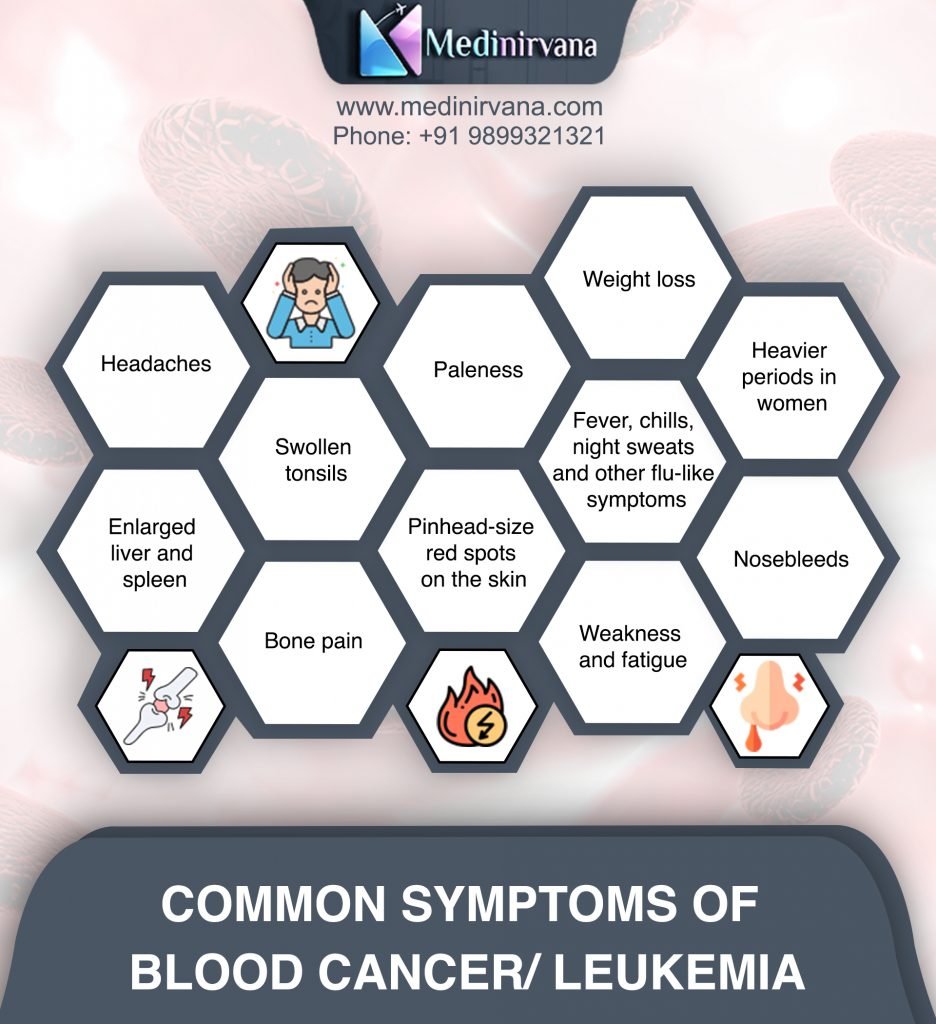Blood cancer or hematologic malignancies are two common types of cancer. Blood cancer is a common term used for the types of cancer that affect blood, bone marrow, or lymphatic system. There have been increasing cases of blood cancer across the globe. Various organizations and research institutes around the world are collaborating to develop novel therapies for treating this cancer.
There are different types of blood cancers such as lymphoma, leukemia, myeloma, and others Each type has its own risk factors, where some can be controlled or prevented through drug therapies. Acute lymphocytic leukemia is the most prevalent type of leukemia, which accounted for 56% of cases in adolescents and 80% in children from 2016 to 2017. (1)
Many countries offer advanced treatment for blood cancer including North America, Latin America, Western Europe, Eastern Europe, Asia-Pacific, etc. India is one of the leading destinations for blood cancer treatment due to advancement in technology, personalized medicine, and cost effective treatment procedures.
Table of contents
- Types of Blood Cancer/Leukemia
- Treatment Options
- How to Plan your Medical tour to India for Blood Cancer treatment?
- What to expect during Blood Cancer Treatment in India?
- Quality of life after Blood cancer treatment in India
- Cost of Blood cancer treatment in India
- Why is India the best country for treating Blood cancer?
1. Types of Blood Cancer/Leukemia
Blood cancer is the most prevalent type of cancer and there has been a growing incidence of blood cancer globally. Few key reasons behind the development of blood cancers are exposure to harsh chemicals, radiation, toxic petrochemicals. Genetic, lifestyle, and environmental factors also play a role, and typically it is a combined effect of two or more conditions that leads to cancer.
Types of blood cancer:
Leukemia, lymphoma, and multiple myeloma are the three main types of blood cancer. Based on morphology and immunologic properties different subtypes occur.
Leukemia – is a type of blood cancer that is related to the abnormal growth of White Blood Cells (WBC) in the bone marrow. White blood cells are an essential part of our defense system and responsible for managing immune and inflammatory processes and protecting against all harmful agents entering our body. Leukemia is further categorized into acute lymphocytic, chronic lymphocytic, acute myeloid, and chronic myeloid leukemia. Many types of leukemia are acute in nature and require aggressive treatment.
Lymphoma is associated with cancer affecting the lymphatic system. This cancer is attached to lymph nodes and can develop in different parts of the body such as bone marrow, blood, and other organs,
Myeloma is a type of cancer wherein plasma cells in WBC are affected. Multiple myeloma is referred to as the condition where bones become thin and also prevent the production of other types of blood cells in the bone marrow.

2. Treatment Options
Based on the type of cancer, stage of diagnosis, symptoms, and how much it is spread, there are various different treatment options available today:
Chemotherapy: Drugs are designed to target and destroy cancerous cells.
Targeted therapy: Drugs are designed to kill targeted cancer cells and do not harm non-cancerous cells.
Radiation therapy: This involves use of high energy X-rays to kill cancer cells.
Stem cell transplantation (bone marrow transplantation): Procedure to replace the affected or damaged bone marrow with healthy bone marrow stem cells.
Preventive therapy to control the recurrence of leukemia cells.
For most types of blood cancer, chemotherapy is the first line of treatment. For better outcome and depending upon the type of blood cancer, chemotherapy is often combined with a particular drug or combination of drugs. Your age and general health is also considered while selecting the best suitable treatment option for you. The doctor will assess your condition before deciding which treatment or combination of treatments is most appropriate for you.
3. How to Plan your Medical tour to India for Blood Cancer treatment?
Here are a few things to keep in mind while preparing your trip to India for treatment:
- Carry your latest blood and other medical report, scans, and referral from your physician
- Also, plan your trip by consulting with your specialist in India. You shouldn’t fly immediately after having a certain treatment or surgery. Ask how long it will take when you can manage the journey comfortably. It is advisable to discuss with your specialist and book your tickets accordingly.
- Ensure that you are in good health for the journey and if possible ask someone to accompany you during this trip.
4. What to expect during Blood Cancer Treatment in India?
- Pre-treatment Care
Your doctor will run a few tests to confirm the presence of leukemia in your blood. This will include physical examination, blood tests, and bone marrow tests to understand the type, stage of cancer and determine your treatment options. You will be asked about your general health, symptoms, severity of symptoms, previous blood test results, medical history, family history, etc. Share a list of medications you are currently taking along with any herbal supplement.
Your specialist will discuss the suitable treatment plans, detailed procedures, what precautions to be taken, and what are the risk factors. You should understand the treatment and discuss your concerns before beginning the treatment. This will make you more confident about your treatment.
- Post-treatment care
The treatment for blood cancer can be tedious and your hospital will provide support through counselors, nutritionists, or even cancer support groups to guide you all the way through recovery. You will be given a set of instructions about your food habits, lifestyle patterns to support the treatment. They will also offer stress relief programs such as Yoga, to help you cope up with major life changes. Also, your doctor and hospital staff will be available to answer your queries and assist you in every way.
5. Quality of life after Blood cancer treatment in India
Most blood cancer types are curable especially when diagnosed early. The recovery period depends mainly upon the type of treatment option. For chemotherapy, for example, the period of treatment ranges from one to four months. The complete recovery will take from one year to two years depending upon the age and general health of the patient.
For the chemotherapy cycle, you will be required to visit the hospital once for every cycle and generally not required to stay overnight. This means you will be visiting the hospital at least 4 to 12 times. For stem cell transplantation procedure you will be required to stay in hospital for some days.
Success rates
Recent innovations in the field of oncology segment have improved the chances of success. The success rate depends largely on the age of the patient. Patients below age 20 have higher success rates. Other factors affecting the success rates
- Time of diagnosis
- Stage of cancer
- Type of cancer
- Genetic history and other external condition playing a role
- Patient’s response to the treatment
India has indeed achieved significant success in oncology treatment. Various medical centres in collaboration with the tourism industry are offering excellent treatment for patients across the world.
6. Cost of Blood cancer treatment in India
The cost of blood cancer treatment in India is extremely low compared with developed countries like the US, UK and also it is lower compared with other medical tourism countries.
The cost of the treatment depends upon:
- Choice of hospital
- Fees of physician
- Medical tests charges
- Duration of stay
- Amenities required
- Follow up care charges
The average cost for treatment ranges between 6000 to 7000 USD. (2)
7. Why is India the best country for treating Blood cancer?
India is one of the top world leaders in health tourism. For many reasons, many foreign patients come here to treat diseases
- Medical professionals are well trained and internationally accredited.
- Techniques and technologies used are advanced and modern.
- The finest hospitals in India are known for their skilled oncologists, world-class services, and affordable packages
- Multi-specialty hospitals offer high-quality services, infrastructure, and personalized services under one roof.
- Most hospital staff is well versed in English and even translator service is available for non-English speaking foreigners
- India is not an expensive country and there are very few living expenses.
- Along with modern medicine, alternate medicines such Ayurveda, Homeopathy are available along with Yoga, meditation centres for patients looking for body as well as mind rejuvenation
- The government is actively working towards making health tourism and the medical visa, a hassle-free process.
- The government, airline, and hospital are taking special care and following various regulations in COVID condition.
- Most hospitals and medical tourism companies will assist you and your relatives in arranging medical visas, accommodation, transport facilities, meals, etc.
Take Away
Blood cancer is a life-threatening disease that attacks the body’s immune system and it is important to choose the right hospital and the right physician for effective treatment.
Over the last few years, India has become a popular destination for blood cancer treatment. This is because of the quality of the services, as well as the expertise available at the top hospitals at affordable prices compared to other western countries. With a high quality of medical facilities and active government promotions, India has become one of the leading destinations for blood cancer treatment.
Source:
1^ https://www.grandviewresearch.com/industry-analysis/hematologic-malignancies-market
2^ https://www.credihealth.com/procedure/india/blood-cancer-treatment-cost






Leave a Reply